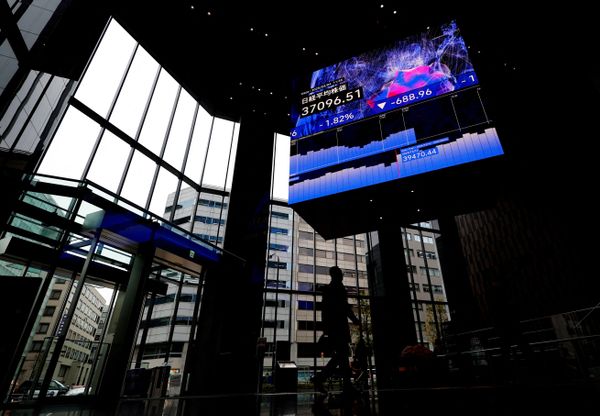TOKYO, March 10 — Wall Street futures sank and the safe-haven yen and Swiss franc strengthened early on Monday as building deflationary pressures in China added to growth worries from a fading US economy and an escalating global trade war.
US S&P 500 stock futures pointed 0.5 per cent lower and Nasdaq futures sagged 0.6 per cent as of 0137 GMT.
Hong Kong’s Hang Seng eased 0.1 per cent, as did an index of mainland Chinese blue chips.
Taiwan’s equity benchmark slipped 0.4 per cent, although Japan’s Nikkei was 0.2 per cent higher after flipping between small gains and losses.
The yen strengthened some 0.6 per cent to 147.245 per dollar, while the franc rose 0.4 per cent to 0.8773 per dollar.
Data on Sunday showed China’s consumer price index fell at the sharpest pace in 13 months in February, while producer price deflation extended to a 30th straight month.
Beijing pledged more stimulus to boost consumption and foster innovation in artificial intelligence at the start of the week-long National People’s Congress meetings that run until Tuesday.
Elsewhere, US President Donald Trump in a Fox News interview on Sunday declined to predict whether his tariffs on China, Canada and Mexico would result in a US recession.
A run of soft US economic data continued on Friday after monthly figures showed the labour market created fewer jobs than expected last month, in the first payrolls report capturing Trump’s policies.
“I think it's Trump’s cavalier approach to economic policy that’s rattling sentiment,” said Kyle Rodda, senior financial markets analyst at Capital.com.
“Unlike during his first administration, where signs of an economic slowdown or market correction would see a pivot on policy, he is genuinely focused on significant, structural change to the economy - even if it comes at the expense of short-term growth.”
US Treasury yields slid, with the 10-year yield dropping as much as 6 basis points (bps) to 4.257 per cent and the two-year yield dipping 4.5 bps to 3.956 per cent.
The US dollar index, which measures the currency against six major peers, eased 0.1 per cent to 103.59.
The euro gained 0.3 per cent to US$1.0866 and sterling rose 0.2 per cent to US$1.2946.
In his latest warning to Canada, Trump said on Friday that reciprocal tariffs on dairy and lumber could be imminent.
The US president also said he is strongly considering sanctions on Russian banks and tariffs on Russian products to try and bring a speedy end to the war in Ukraine.
That has dragged on crude oil, with Brent down 0.4 per cent at US$70.11 a barrel on Monday and US West Texas Intermediate crude down by a similar margin to US$66.76 a barrel.
Gold, another traditional haven asset, added 0.15 per cent to US$2,915 an ounce.
Cryptocurrency bitcoin lost as much as 7.2 per cent from Friday to reach the lowest this month at US$80,085.42.
Optimism about looser regulation and the creation of a cryptocurrency reserve under Trump lifted the token to an all-time high of US$109,071.86 in January, but it has struggled since.
The long-awaited executive order on creating the reserve came on Friday, but disappointed many investors by saying there would be no additional buying of bitcoin.
— Reuters




